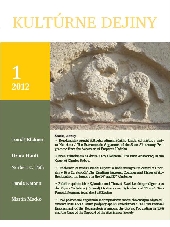Nová aristokracia na dvore Karola Róberta. Budovanie osobných a politických väzieb palatína Filipa Drugetha
The New Aristocracy at the Court of Charles Robert. Building Personal and Political Ties of Palatine Philip Drugeth
Author(s): Đura HardiSubject(s): History
Published by: VERBUM - vydavateľstvo Katolíckej univerzity v Ružomberku
Keywords: Philip Drugeth; Hungary; 14th century; Charles Robert; New Anjou Aristocracy; Royal Court
Summary/Abstract: In the study the author explores personal ties of the Hungarian Palatine Philip Drugeth (1323 – 1327) with representatives of the new Anjou elite during the reign of the Hungarian King Charles Robert (1301 – 1342). The basis of his exceptional status among the Hungarian aristocracy was in his close personal relationship to the monarch, arising from the fact that Philip, as the only person at the court, was the king’s familiar in their common homeland, the Kingdom of Naples. I t is noteworthy that the information on Philip’s personal ties and prestige at the court is confined just to diplomatic sources. After victories in wars against the rebellious Hungarian oligarchy, the monarch made him a palatine. Thus Philip became the most powerful oligarch (baron) in the kingdom and a leader of new aristocracy. He enjoyed the authority, which did not stem only from his close ties to the monarch. It also resulted from his personal and family ties with part of Hungarian barons. Among close Philip Drugeth’s friends were the head of the Hungarian Church, the Archbishop of Esztergom, Thomas, as well as the royal magister tavernicorum and scholar Demeter Nékcsei, the author of Charles’ financial reform. The archbishop titled Philip as his most valuable friend, and vice versa Philip symbolically regarded him as father. One of the highest officials at the court, the secretary of Charles Robert and the bishop of Eger Csanád was his godfather, just like the county head (comes) of the Zala county and future Slavonian and Croatian ban Hahold. With the exception of the latter, all Philip’s closest “friends” were eminently educated and most of them studied at one of Italian universities in the late 13th century. The very fact that they were all in close personal relationship to Philip Drugeth indicates something of his personality and the monarch as well. We can say that at the royal court it was them that were carriers of the new spirit of knighthood and courtly culture, which reminded Charles Robert of his native Naples. Philip Drugeth had the closest family ties with his devoted fellow from the times of the wars against Hungarian magnates, the Slavonian ban Mikcs Ákos. According to available testimonies, their houses in the royal residential city of Visegrád, where the courtly life took place, stood close to each other. He gave his only child, daughter Klára, to Mikcs’ son.
Journal: Kultúrne dejiny
- Issue Year: 2012
- Issue No: 1
- Page Range: 25-35
- Page Count: 11
- Language: Slovak

